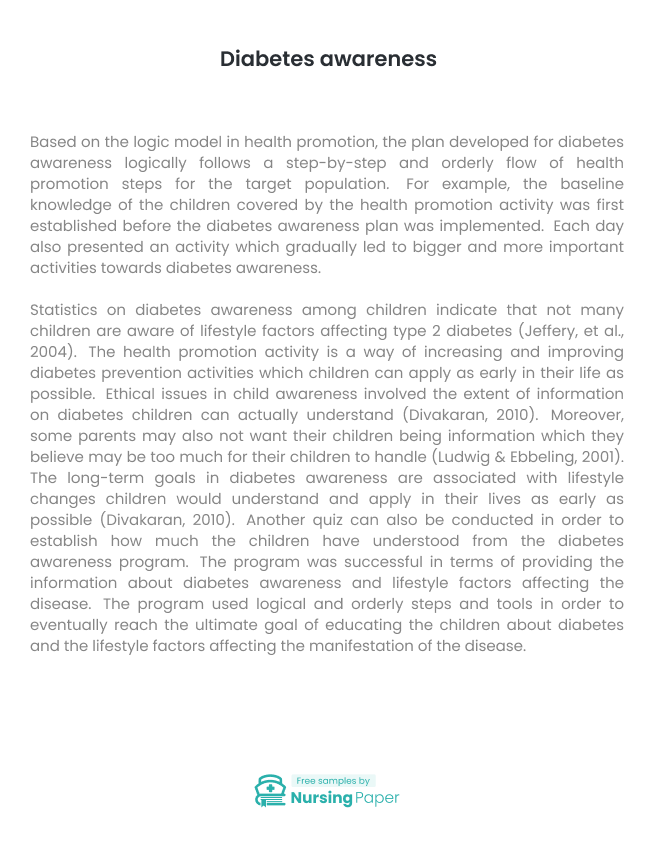
Introduction
Based on the logic model in health promotion, the plan developed for diabetes awareness logically follows a step-by-step and orderly flow of health promotion steps for the target population. For example, the baseline knowledge of the children covered by the health promotion activity was first established before the diabetes awareness plan was implemented. Each day also presented an activity which gradually led to bigger and more important activities towards diabetes awareness.
Statistics on diabetes awareness among children indicate that not many children are aware of lifestyle factors affecting type 2 diabetes (Jeffery, et al., 2004). The health promotion activity is a way of increasing and improving diabetes prevention activities which children can apply as early in their life as possible. Ethical issues in child awareness involved the extent of information on diabetes children can actually understand (Divakaran, 2010). Moreover, some parents may also not want their children being information which they believe may be too much for their children to handle (Ludwig & Ebbeling, 2001). The long-term goals in diabetes awareness are associated with lifestyle changes children would understand and apply in their lives as early as possible (Divakaran, 2010). Another quiz can also be conducted in order to establish how much the children have understood from the diabetes awareness program. The program was successful in terms of providing the information about diabetes awareness and lifestyle factors affecting the disease. The program used logical and orderly steps and tools in order to eventually reach the ultimate goal of educating the children about diabetes and the lifestyle factors affecting the manifestation of the disease.


1. Divakaran, B., Muttapillymyalil, J., Sreedharan, J., & Shalini, K. (2010). Lifestyle riskfactors of noncommunicable diseases: awareness among school children. Indian journal of cancer, 47(5), 9.
2. Jeffery, A. N., Voss, L. D., Metcalf, B. S., Alba, S., & Wilkin, T. J. (2004). Parents’ awareness of overweight in themselves and their children: cross sectional study within a cohort (EarlyBird 21). Bmj, 330(7481), 23-24.
3. Ludwig, D. S., & Ebbeling, C. B. (2001). Type 2 diabetes mellitus in children: primary care and public health considerations. Jama, 286(12), 1427-1430.



The download will start shortly.

The download will start shortly.
 Subject:
Health and Social Care
Subject:
Health and Social Care  Number of pages: 3
Number of pages: 3  Subject:
Medicine
Subject:
Medicine  Number of pages: 4
Number of pages: 4  Subject:
Medicine
Subject:
Medicine  Number of pages: 3
Number of pages: 3  Subject:
Nursing
Subject:
Nursing  Number of pages: 3
Number of pages: 3  Subject:
Medicine
Subject:
Medicine  Number of pages: 3
Number of pages: 3  Subject:
Medicine
Subject:
Medicine  Number of pages: 10
Number of pages: 10  Subject:
Medicine
Subject:
Medicine  Number of pages: 3
Number of pages: 3  Subject:
Health and Social Care
Subject:
Health and Social Care  Number of pages: 2
Number of pages: 2  Subject:
Medicine
Subject:
Medicine  Number of pages: 5
Number of pages: 5  Subject:
Nursing
Subject:
Nursing  Number of pages: 28
Number of pages: 28  Subject:
Medicine
Subject:
Medicine  Number of pages: 2
Number of pages: 2  Subject:
Medicine
Subject:
Medicine  Number of pages: 2
Number of pages: 2  Subject:
Medicine
Subject:
Medicine  Number of pages: 6
Number of pages: 6  Subject:
Medicine
Subject:
Medicine  Number of pages: 2
Number of pages: 2  Subject:
Health and Social Care
Subject:
Health and Social Care  Number of pages: 13
Number of pages: 13 
